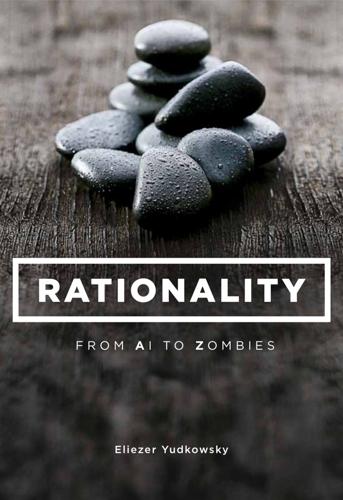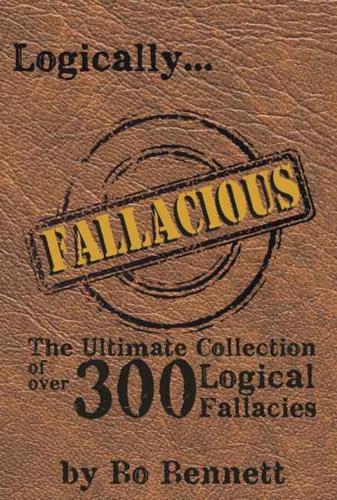Mind Projection Fallacy
description: an informal fallacy when someone thinks that the way they see the world reflects the way the world really is
4 results

Rationality: From AI to Zombies
by
Eliezer Yudkowsky
Published 11 Mar 2015
Since the woman is attractive, the alien monster will be attracted to her—isn’t that logical? E. T. Jaynes used the term Mind Projection Fallacy to denote the error of projecting your own mind’s properties into the external world. Jaynes, as a late grand master of the Bayesian Conspiracy, was most concerned with the mistreatment of probabilities as inherent properties of objects, rather than states of partial knowledge in some particular mind. More about this shortly. But the Mind Projection Fallacy generalizes as an error. It is in the argument over the real meaning of the word sound, and in the magazine cover of the monster carrying off a woman in the torn dress, and Kant’s declaration that space by its very nature is flat, and Hume’s definition of a priori ideas as those “discoverable by the mere operation of thought, without dependence on what is anywhere existent in the universe” . . .
…
Just thought I’d mention that.) * 193 Probability is in the Mind In the previous essay I spoke of the Mind Projection Fallacy, giving the example of the alien monster who carries off a girl in a torn dress for intended ravishing—a mistake which I imputed to the artist’s tendency to think that a woman’s sexiness is a property of the woman herself, Woman.sexiness, rather than something that exists in the mind of an observer, and probably wouldn’t exist in an alien mind. The term “Mind Projection Fallacy” was coined by the late great Bayesian Master E. T. Jaynes, as part of his long and hard-fought battle against the accursèd frequentists.
…
It is not that reality itself has an Einstein equation that governs at high speeds, a Newton equation that governs at low speeds, and a “bridging law” that smooths the interface. Reality itself has only a single level, Einsteinian gravity. It is only the Mind Projection Fallacy that makes some people talk as if the higher levels could have a separate existence—different levels of organization can have separate representations in human maps, but the territory itself is a single unified low-level mathematical object. Suppose this were wrong. Suppose that the Mind Projection Fallacy was not a fallacy, but simply true. Suppose that a 747 had a fundamental physical existence apart from the quarks making up the 747. What experimental observations would you expect to make, if you found yourself in such a universe?

Logically Fallacious: The Ultimate Collection of Over 300 Logical Fallacies (Academic Edition)
by
Bo Bennett
Published 29 May 2017
• Lip Service: Pretending to agree when it's clear that you don't really agree. • Lump of Labor Fallacy (Lump of Jobs Fallacy): The contention that the amount of work available to laborers is fixed. This can be debatable, depending on the economist asked. • Mind Projection Fallacy: Coined by physicist and bayesian philosopher E.T. Jaynes, the mind projection fallacy occurs when one believes with certainty that the way he sees the world reflects the way the world really is. • Monopolizing the Question: Asking a question and then immediately giving the answer, in a way “forcing” your answer on the audience. • Norm of Reciprocity: A technique used to exploit people's natural tendency to want to repay debts.
…
Contents Preface Introduction Reasoning Arguments Beliefs Fallacies On Reason and Rationality Collecting Fallacies Being a Smart-Ass Format and Style of this Book The Fallacies Accident Fallacy Ad Fidentia Ad Hoc Rescue Ad Hominem (Abusive) Ad Hominem (Circumstantial) Ad Hominem (Guilt by Association) Ad Hominem (Tu quoque) Affirmative Conclusion from a Negative Premise Affirming a Disjunct Affirming the Consequent Alleged Certainty Alternative Advance Appeal to Accomplishment Appeal to Anger Appeal to Authority Appeal to Celebrity Appeal to Common Belief Appeal to Common Folk Appeal to Coincidence Appeal to Consequences Appeal to Definition* Appeal to Desperation Appeal to Emotion Appeal to Extremes Appeal to Faith Appeal to Fear Appeal to Flattery Appeal to Force Appeal to Heaven Appeal to the Moon Appeal to Nature Appeal to Novelty Appeal to Pity Appeal to Popularity Appeal to Possibility Appeal to Ridicule Appeal to Tradition Ambiguity Fallacy Anonymous Authority Argument by Emotive Language Argument by Fast Talking Argument by Gibberish Argument by Personal Charm Argument by Repetition Argument from Age Argument from Fallacy Argument from Hearsay Argument from Ignorance Argument from Silence Argument of the Beard Argument to Moderation Avoiding the Issue Argument to the Purse Base Rate Fallacy Begging the Question Biased Sample Fallacy Blind Authority Fallacy Broken Window Fallacy Causal Reductionism Cherry Picking Circular Reasoning Commutation of Conditionals Complex Question Fallacy Conflicting Conditions Confusing an Explanation with an Excuse Conjunction Fallacy Conspiracy Theory Definist Fallacy Denying the Antecedent Denying a Conjunct Denying the Correlative Disjunction Fallacy Distinction Without a Difference Equivocation Etymological Fallacy Exclusive Premises Existential Fallacy Extended Analogy Failure to Elucidate Fallacy of Composition Fallacy of Division Fallacy of Four Terms Fallacy of Necessity Fallacy of (the) Undistributed Middle Fake Precision False Attribution False Conversion False Dilemma False Effect Far-Fetched Hypothesis Faulty Comparison Gambler’s Fallacy Genetic Fallacy God Wildcard Fallacy* Hasty Generalization Having Your Cake Hedging Historian’s Fallacy Homunculus Fallacy Hypnotic Bait and Switch Hypothesis Contrary to Fact If-By-Whiskey Illicit Contraposition Illicit Major Illicit Minor Illicit Substitution of Identicals Inconsistency Inflation of Conflict Jumping to Conclusions Just Because Fallacy* Just In Case Fallacy Least Plausible Hypothesis Limited Depth Limited Scope Logic Chopping Ludic Fallacy Lying with Statistics Magical Thinking Meaningless Question Misleading Vividness Missing Data Fallacy* Modal (Scope) Fallacy Moralistic Fallacy Moving the Goal Posts Multiple Comparisons Fallacy Naturalistic Fallacy Negative Conclusion from Affirmative Premises Negating Antecedent and Consequent Nirvana Fallacy No True Scotsman Non Sequitur Notable Effort Overwhelming Exception Package-Deal Fallacy Poisoning the Well Political Correctness Fallacy Post-Designation Prejudicial Language Proof by Intimidation Proving Non-Existence Quantifier-Shift Fallacy Quantum Physics Fallacy* Questionable Cause Rationalization Red Herring Reductio ad Absurdum Reductio ad Hitlerum Regression Fallacy Reification Relative Privation Retrogressive Causation Retrospective Determinism Scapegoating Selective Attention Self-Sealing Argument Shoehorning Slippery Slope Special Pleading Spiritual Fallacy* Spotlight Fallacy Statement of Conversion Stereotyping Stolen Concept Fallacy Strawman Fallacy Style Over Substance Subjectivist Fallacy Subverted Support Sunk-Cost Fallacy Suppressed Correlative Texas Sharpshooter Fallacy Tokenism Two Wrongs Make a Right Unfalsifiability Unwarranted Contrast Use-Mention Error Weak Analogy Willed Ignorance Wishful Thinking B-List Fallacies Abductive Fallacy Accent Fallacy (fallacy of prosody) Amazing Familiarity Ambiguity Effect Ambiguous Assertion Appeal to Closure (more specific form of argument from ignorance) Appeal to Coincidence Appeal to Complexity Appeal to Convenience Appeal to Luck (good or back luck) Appeal to Envy (Argumentum ad invidiam) Appeal to Equality Appeal to Intuition Appeal to Privacy Appeal to Stupidity Appeal to Utility Argument by Dismissal Argument by Laziness Argument by Pigheadedness Argument by Rhetorical Question Argument by Selective Reading Argument by Uniformed Opinion Argument from Design Argument from Inertia Argument from Omniscience Argument To The Future Argumentum ad Captandum Argumentum ad Exemplum (Argument to the Example) Barking Cat Big Lie Technique Blood is Thicker than Water (Favoritism) Bribery (Material Persuasion, Material Incentive, Financial Incentive) Burden of Proof Fallacy (onus probandi, shifting the) Chronological Snobbery Confesses Under Torture Contextomy Damning with Faint Praise Double Bind Double Standard Emphasis Fallacy Essentializing Fallacy Exaggeration Exception That Proves The Rule Failure to State Fallacy of Multiplication Fallacy of Opposition Fallacy of Quoting Out of Context Fallacy of the Crucial Experiment Fantasy Projection Faulty Sign Finish the Job Fallacy Galileo Wannabe Golden Hammer Fallacy Hifalutin' Denunciations I Wish I Had a Magic Wand In a Certain Respect and Simply Intentional Fallacy Invincible Ignorance Fallacy Knights and Knaves Lack of Proportion Latino Fallacy* Lies (Misrepresentation) Lip Service Lump of Labor Fallacy (Lump of Jobs Fallacy) Mind Projection Fallacy Monopolizing the Question Norm of Reciprocity Not Invented Here Outdated Information Packing the House Paralogism Paralysis of Analysis (Procrastination) Pigeonholing Pious Fraud Pragmatic Fallacy Preacher’s We Probabilistic Fallacy Psychologist's Fallacy Redefinition Reductionism Sanctioning the Devil Scope Fallacy Self-Deception Self-Fulfilling Prophecy Self-Righteousness Sherlock Holmes Fallacy Sly Suggestions Snow Job Sour Grapes Spin Doctoring Taboo Tautology There Is No Alternative Too Broad Too Narrow Undoability Weasel Wording Word Magic Top 25 Most Common Fallacies Bo's Original Fallacies About the Author Preface Several years back, while entering some kind of early-stage, intellectual, mid-life crisis, I became passionate about science, philosophy, and religion, which eventually led to my starting a debate website called DebateGod (http://www.debategod.org), as a way to help me understand how other people think, and come to the conclusions they do.

Global Catastrophic Risks
by
Nick Bostrom
and
Milan M. Cirkovic
Published 2 Jul 2008
Anyone seeking to reduce anthropomorphic bias in himself or herself would be well advised to study evolutionary biology for practice, preferably evolutionary biology with maths. Early biologists often anthropomorphized 1 This is a case of a deep, confusing, and extraordinarily common mistake that E.T. Jaynes named the mind projection fallacy (Jaynes and Bretthorst, 2003). Jaynes, a physicist and theorist of Bayesian probability, coined 'mind projection fallacy' to refer to the error of confusing states of knowledge with properties of objects. For example, the phrase mysterious phenomenon implies that mysteriousness is a property of the phenomenon itself. If I am ignorant about a phenomenon, then this is a fact about my state of mind, not a fact about the phenomenon.
…
Stock 80 meteor impact, as cause of mass extinctions 255, 258-9 meteor showers 227, 228 meteor strike risk 1 4- 1 5 meteoroids, a s source o f atmospheric dust 232-3 methane, release from permafrost 274 methane hydrate, release from oceans 273 method of moments 156 microbial toxins 300, 453 use in bioterrorism 456 microcephalin genes 58 global frequencies 59-60 M iddle East, nuclear programmes 397-9, 400 Milankovitch cycles 239-41 Milky Way, collision with Andromeda 37-8 millenarianism 77 millenialism 9, 73-4 amillenialism 75-6 apocalypticism 77, 78, 409, 417 dysfunctional manifestations 84-5 positive effects 83-4 post-millenialism 76 premillenialism 74-5 techno-apocalypticism 81-3 techno-millenialism 79-81 utopianism 77-8 Millenia/ism, Utopianism, and Progress, Olson, T. 86 Millennium Bug 82-3, 340 M illerism 74-5 mind projection fallacy 3 1 0 mini-black holes 349-50 minimal standard model 354 Minuteman ballistic missiles 382 consequences of strike 389 mistakes, as cause of nuclear war 2 1 , 382, 383, 384, 426-7 mitigation policy 29 climate change 16, 277, 279-81 see also risk mitigation model risk 176, 180 model uncertainty, climate change 275-6 molecular manipulators 331 molecular manufacturing 24-5, 481 , 482, 484-6, 498-9 global catastrophic risks 488-9 destructive global governance 492 economic and social disruption 492 ecophagy 495-6 enhanced intelligences 494 environmental degradation 494-5 war 489-92 products 486-7 weapons 487-8 risk mitigation 496-8 molecular nanotechnology 33 1-2 Monod, J. 308 Moon, impact craters 127, 223-4 Moore's Law 79, 328, 450 Moore's Law of Mad Science 338 moral satisfaction, purchase of 106 Moravec, H.P. 1 37 Robot: Mere Machine to Transcendent Mind 79-80 morbidity of infectious diseases 291-2 mortality rates of infectious diseases 292 mosquitoes, disease transmission 289, 296 motivated cognition (rationalization) 99 motivated scepticism (disconfirmation bias) 99, 100 motivation artificial intelligence 3 1 6 , 3 1 7 for nuclear terrorism 406-1 1 mousepox research 457 Mt Pinatubo eruption, effect on climate 270 Mt St Helens eruption ( 1980) , cooling effect 208 Index Mulhall, D., Our Molecular Future 500 Mulligan, J. 464 multiple catastrophic events 167 multiple reliabilities 161-2 multiplier effects, social collapse 367 multiregional hypothesis, origin of modern humans 2 1 1 multi-stakeholder partnerships, role in biotechnology risk management 462-3 muons, effect on life 249, 254 mutation 49 mutual insurance 170 Mutually Assured Destruction (MAD) 490 Myers, N . and Knoll A.H. 69 Nagasaki bomb 428 nano-built weaponry 487-8, 489-92 nanofactories 485-6, 495, 498 block-assembly operation 497 products 486-7 Nanofuture, Hall, J .

Superintelligence: Paths, Dangers, Strategies
by
Nick Bostrom
Published 3 Jun 2014
A member of an intelligent social species might also have motivations related to cooperation and competition: like us, it might show in-group loyalty, resentment of free riders, perhaps even a vain concern with reputation and appearance. Figure 12 Results of anthropomorphizing alien motivation. Least likely hypothesis: space aliens prefer blondes. More likely hypothesis: the illustrators succumbed to the “mind projection fallacy.” Most likely hypothesis: the publisher wanted a cover that would entice the target demographic. An AI, by contrast, need not care intrinsically about any of those things. There is nothing paradoxical about an AI whose sole final goal is to count the grains of sand on Boracay, or to calculate the decimal expansion of pi, or to maximize the total number of paperclips that will exist in its future light cone.